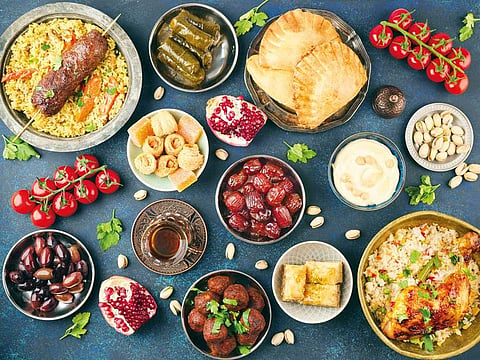Iftar at home: DIY buffet
How to set up a restaurant-style spread at home

One of the traditional hallmarks of the UAE’s Ramadan scene is the iftar buffet. Fasters and non-fasters alike queue up with their plates, hungry minds deciding what items will make the ideal investment for their share of stomach as themed music plays in the back.
Thanks to the country’s restrictions on movement and stay home and physical distancing guidelines, this holy month is a little different. However, with work from home measures in place for a large number of residents providing a lot more spare time than usual, here are some ways in which you can recreate a semblance of the iftar buffet experience at home.
“As per the Supreme Committee of Crisis and Disaster Management announcement, you can host an iftar with up to five family members or relatives in Dubai,” says Dr Ahmed El Tigani, CEO of Al Rawabi Dairy. Keeping these limited numbers in mind, he says, “We would recommend creating individual servings from each dish to be served during iftar so that each member of your family can choose and pick their preferred option. This is also a great solution to avoid wastage, as you can easily keep the non-consumed food for the next day, while ensuring it is safe from potential germs.”
We would recommend creating individual servings from each dish to be served during iftar so that each member of your family can choose and pick their preferred option. This is also a great solution to avoid wastage, as you can easily keep the non-consumed food for the next day, while ensuring it is safe from potential germs.

Beverages
For a lot of people, the thirst of a fast can feel harder to deal with than the hunger, so it’s vital to offer a selection of drinks at your buffet. To keep fasters hydrated, Al Rawabi has a range of beverages that can help. Dr El Tigani recommends opening the fast with two-to-three plain dates accompanied by a glass of the brand’s vitamin D-enriched milk, which also contains plenty of calcium. Additionally, Al Rawabi orange juice packs in vitamins A and C, as well as important minerals such as potassium, calcium and folate.
“For your iftar, you should prefer water, juices, low-fat milk, vegetables, fruits, healthy carbs and lean proteins,” says Dr El Tigani. “Stay away from heavy meals that will not provide you with the proper vitamins, nutrients and amino acids needed to refuel your body.”
Meat ideas
Protein is another nutrient that’s important for the body, and one easy way to get it is through chicken. IFFCO Poultry’s Al Khazna brand meets this need. In line with shifting consumer preferences, Al Khazna had launched recipe-specific pre-cuts of meat, with or without skin, most recently adding mixed parts and broast cuts to its product roster. Depending on the size of your family, these chicken cuts are available in heat-sealed hygienic packs of four, eight and 12 pieces. There are also whole chickens that can be bought – all you need to do is marinate one of these in a mix of garlic, chilli and yoghurt for an hour or so in the fridge, chuck it in the air fryer and you’ve got a healthy, tasty and oil-free bird.
Another company ready to supply a meat fix to your table is Al Islami. The Dubai-based halal provider supplies more than 100 frozen products, including beef, chicken and veggie burgers, nuggets and fries – all things beloved by children. For the adults, throw some mixed frozen vegetables into a minced meat wok loaded with ginger-garlic paste, green chillies, onions and tomatoes to add a slightly continental twist to a South Asian flavour.
Restaurant roles
For UAE restaurants, Covid-19 has forced a drastic operational shift. “Many of these restaurants offer a more traditional experience related to decor and ambience,” explains Mohammed Dhedhi, Principal, Consumer Industries and Retail practice at management consultancy Kearney. “The equivalent value offer in a delivery model would be to create a kit that combines food with experience, for example, a Moroccan iftar meal for four, with environmentally friendly, themed cutlery and a paper tablecloth. Another area that restaurants can explore is the idea of a subscription meal model – perhaps even teaming up with other restaurants to offer a discounted offer for a set of meals.”
To set the right ambience, match your music to the food – for example, some low-volume qawwali tracks if you’re dining on Punjabi dishes, or a gentle oud soundtrack playing to the backdrop of grilled kibbeh.

